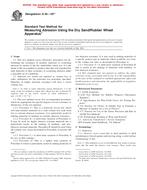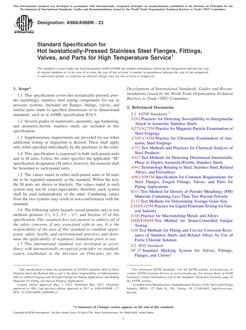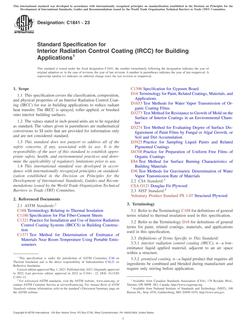
ASTM G65-00e1
- Comments Off on ASTM G65-00e1
- ASTM
1.1 This test method covers laboratory procedures for determining the resistance of metallic materials to scratching abrasion by means of the dry sand/rubber wheel test. It is the intent of this test method to produce data that will reproducibly rank materials in their resistance to scratching abrasion under a specified set of conditions.
1.2 Abrasion test results are reported as volume loss in cubic millimetres for the particular test procedure specified. Materials of higher abrasion resistance will have a lower volume loss.
Note 1–In order to attain uniformity among laboratories, it is the intent of this test method to require that volume loss due to abrasion be reported only in the metric system as cubic millimetres. 1 mm³ = 6.102 X 10-5in³.
1.3 This test method covers four recommended procedures which are appropriate for specific degrees of wear resistance or thicknesses of the test material.
1.3.1 Procedure A -This is a relatively severe test which will rank metallic materials on a wide volume loss scale from low to extreme abrasion resistance. It is particularly useful in ranking materials of medium to extreme abrasion resistance.
1.3.2 Procedure B -A short-term variation of Procedure A. It may be used for highly abrasive resistant materials but is particularly useful in the ranking of medium- and low-abrasive-resistant materials. Procedure B should be used when the volume-loss values developed by Procedure A exceeds 100 mm³.
1.3.3 Procedure C -A short-term variation of Procedure A for use on thin coatings.
1.3.4 Procedure D -This is a lighter load variation of Procedure A which is particularly useful in ranking materials of low-abrasion resistance. It is also used in ranking materials of a specific generic type or materials which would be very close in the volume loss rates as developed by Procedure A.
1.3.5 Procedure E -A short-term variation of Procedure B that is useful in the ranking of materials with medium- or low-abrasion resistance.
1.4 This standard does not purport to address the safety concerns, if any, associated with its use. It is the responsibility of the user of this standard to establish appropriate safety and health practices and determine the applicability of regulatory limitations prior to use.
Product Details
- Published:
- 10/10/2000
- Number of Pages:
- 12
- File Size:
- 1 file , 390 KB



